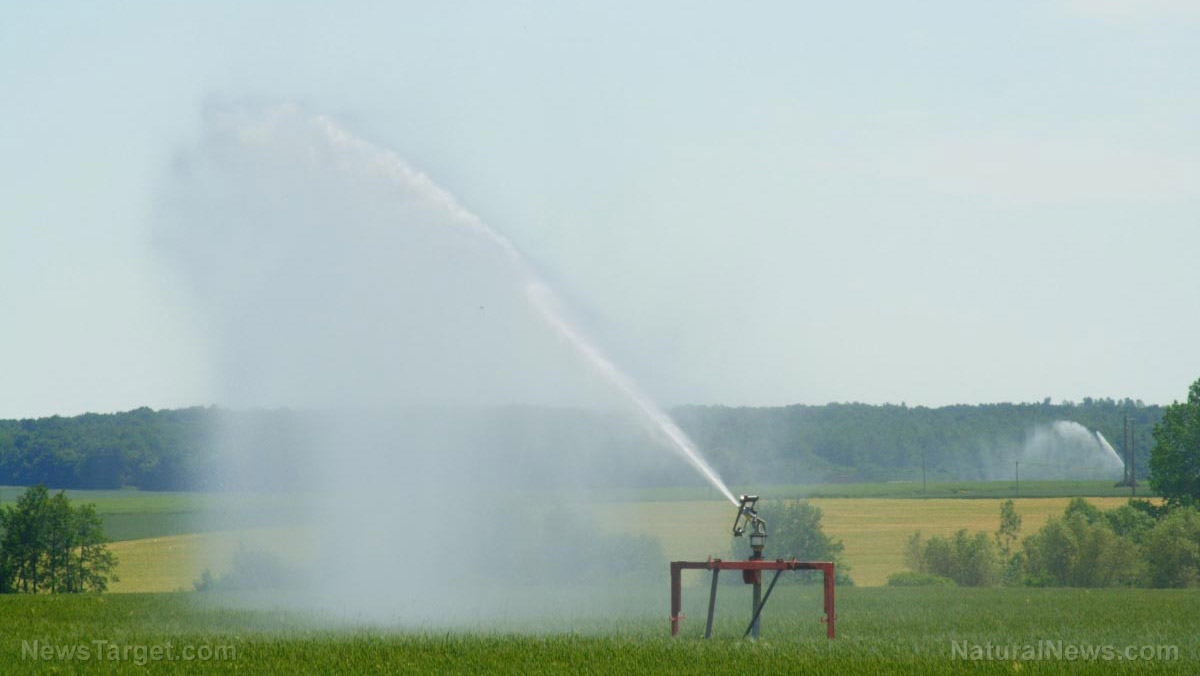Climate change blamed for drying of Great Plains streams, but it’s actually caused by groundwater pumping for irrigation
08/08/2017 / By Amy Goodrich

Streams and rivers in Kansas, Colorado, Nebraska, and other parts of the central Great Plains are drying up as farmers continue to pump groundwater to irrigate their crops, a new study found.
Though climate change often gets blamed for turning creeks into dry riverbeds, the water needed to irrigate one sixth of the world’s grain production comes from the High Plains Aquifer, also known as the Ogallala Aquifer.
Irrigation of crops accounts for 90 percent of the human global use of water. Groundwater from the High Plains Aquifer is the single greatest source of groundwater in North America and the lifeblood of Great Plains agriculture. As farmers increasingly pump more water, nearby creeks and riverbeds are vanishing at a rapid pace. As their habitat diminishes, native fish species are disappearing too.
“What we’re losing are the fishes that require habitat found only in the rivers and large streams of the region, and replacing them with those that can survive in the small streams that are left,” said Fausch, a Colorado State University (CSU) professor. “We are losing whole populations of species from rivers in that region because there’s no habitat for them.”
Since the first surveys were done in the 1940s, seven of the 16 native fish species — including small minnows, suckers, and catfish — that were once found in the Arikaree River have disappeared. Nonetheless, these fish are not among those that are currently federally endangered or threatened. Therefore, little regulatory authority is in place to preserve the habitats of these native fish.
A finite resource of water that is not being recharged
The CSU researchers warned that these habitats and the fish populations will continue to shrink if pumping practices are not modified. According to Professor Fausch, about 350 miles of streams disappeared in eastern Colorado, southwest Nebraska, and northwest Kansas in a 60-year span. If nothing changes, the team’s models predicted another 180 miles could vanish by 2060.
Fausch noted their results are sobering, adding that if we keep pumping groundwater to feed a growing human population of more than 7 billion people, the Arikaree River in eastern Colorado, which used to flow about 70 miles, will dry up to about one-half mile by 2045.
As more water is being pumped out every year, only a small amount flows back into the aquifer from rain and snow. As reported by Science Daily, nearly as much water as what exists in Lake Erie, or about 100 trillion gallons, has been extracted from the aquifer since the 1950s and only a small amount has trickled back into the reservoir.
A grim future for the generations to come
If we don’t tackle the problem and keep pumping groundwater at this pace, farmers are not only thoughtlessly jeopardizing the streams and fish, but also the future of the next generation of farmers. Without the rivers and streams, these farmers will be unable to continue to work on the land. They will have no water for their cattle and the cottonwoods that provide shade, Fausch explained.
“They also lose the grass that grows in the riparian zone, which is critical forage for cattle in summer. Some of that’s your livelihood, but it’s also the place you go for picnics, and to hunt deer and turkeys. If you lose the river, you lose a major feature of what that landscape is,” he added.
While the future looks grim, Fausch said that there are some signs of progress. Meters are being installed on wells to ensure that farmers pump only the amount of water allowed under their permits. Furthermore, farmers are looking for ways to optimize their water usage with new technology to slow down the declining groundwater levels.
“When we lose these rivers, we will lose them for our lifetime, our children’s lifetime, and our grandchildren’s lifetime,” Fausch noted.
Stay informed about the threats our environment is facing today at Environ.news.
Sources include:
Tagged Under: agriculture, climate change, climate science, farming, fossil water, global warming, Great Plains, groundwater, irrigation, skeptics, water




















